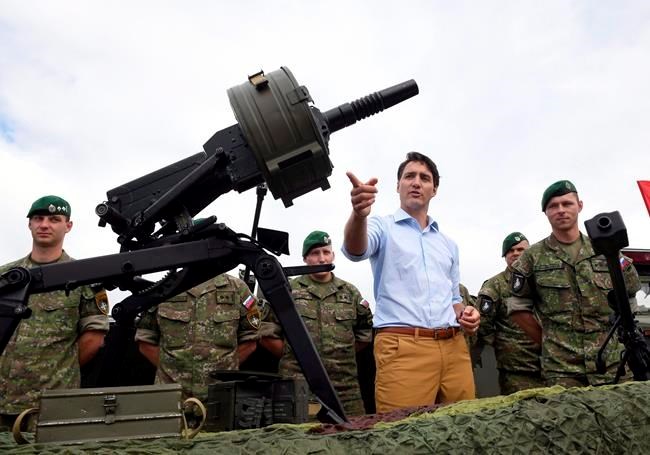OTTAWA — The head of NATO is proposing member states be compensated for contributing troops to some alliance missions, saying it is unfair that countries like Canada must bear all the costs when participating in operations that benefit the entire organization.
Yet NATO secretary-general Jens Stoltenberg also expects all members, including Canada, to make good on their commitments to spend more on their militaries in the face of growing instability throughout the world.
Stoltenberg made the comments during a virtual news conference from Brussels on Monday, ahead of a meeting of NATO defence ministers where his plan to compensate countries that send troops abroad will be one of several topics up for debate
Defence ministers are also expected to discuss the futures of Afghanistan and Iraq, where Canada has been slowly withdrawing troops after nearly seven years fighting the Islamic State of Iraq and the Levant, as well as the threat posed by China and Russia.
It will be the first such meeting since U.S. President Joe Biden’s inauguration, which has resulted in high hopes for smoother relations between the transatlantic alliance and the White House after four bruising years under Donald Trump.
Canada stands to benefit from any move to compensate members for what the alliance describes as “core deterrence and defence activities” on alliance territory, namely for the deployment of hundreds of troops to Latvia.
Stoltenberg noted Canada’s contributions to Latvia, where the Canadian military is leading a NATO alliance battlegroup whose mission is to deter Russian aggression in the region, as he painted his proposal as an issue of fairness.
“I strongly believe that it will be fair if the country that deployed troops does not cover all the costs, but that NATO, that we pay together, that we fund together, more of the costs,” Stoltenberg said in response to a question from The Canadian Press.
“We should increase funding for deterrence and defence activities like the Canadian-led battlegroup in Latvia with our NATO budgets, because now we have a system where those countries that provide the troops also cover all the costs.”
The NATO leader also suggested his proposal would strengthen the bonds among NATO’s 28 member states by having them all put skin in the game when it comes to missions, and be another way to measure how members contribute to the alliance.
Stoltenberg’s proposal would not apply to Canadian deployments outside of NATO’s borders, including its contribution of troops to help train the Iraqi military.
NATO in recent years has largely assessed whether individual countries are contributing to the alliance’s strength by measuring them against a promise all members made in 2014 to spend two per cent of their gross domestic product on defence.
Yet while Canada joined other members in agreeing to that target, it has consistently spent less than 1.5 per cent of GDP on the military and has no plan to meet the two per cent threshold. Instead, it has argued for other ways to measure contributions.
That includes assessing the degree to which it and other members contribute to NATO missions.
Defence Minister Harjit Sajjan’s office was noncommittal when asked about the proposal on Monday.
"With respect to the use of common funding to support NATO deployments, we look forward to discussing secretary-general Stoltenberg’s NATO2030 vision at the NATO defence ministerial later this week," Sajjan spokesman Todd Lane said in an email.
Yet NATO Association of Canada president Robert Baines said Stoltenberg’s proposal appears to reflect Ottawa’s argument that the two per cent target alone isn’t a good way to measure how countries are contributing to the alliance.
“And I'm sure Canada will welcome it tremendously,” Baines said.
NATO figures published in October predicted that Canada would spend 1.45 per cent of its GDP on the military in 2020, the highest share of the national economy in at least a decade.
Yet while that is partly a reflection of recent increases in defence spending, it was also because of the economic damage wrought by COVID-19, while the federal Liberal government has no plan to meet the two per cent target in the coming decades.
That is despite repeated pressure from both NATO and successive U.S. governments, including Trump.¬Ý
“We appreciate the increased defence spending we have seen in Canada,” Stoltenberg said. “I expect this to continue.”
This report by The Canadian Press was first published Feb. 15, 2021.
Lee Berthiaume, The Canadian Press




